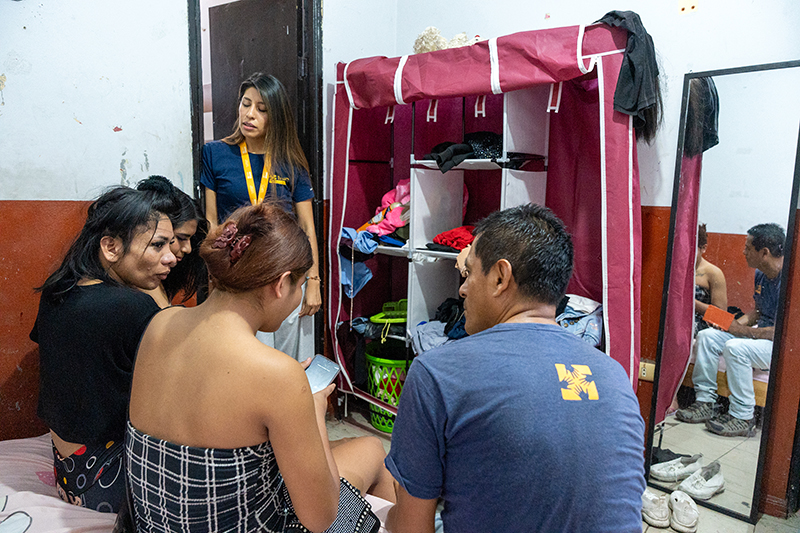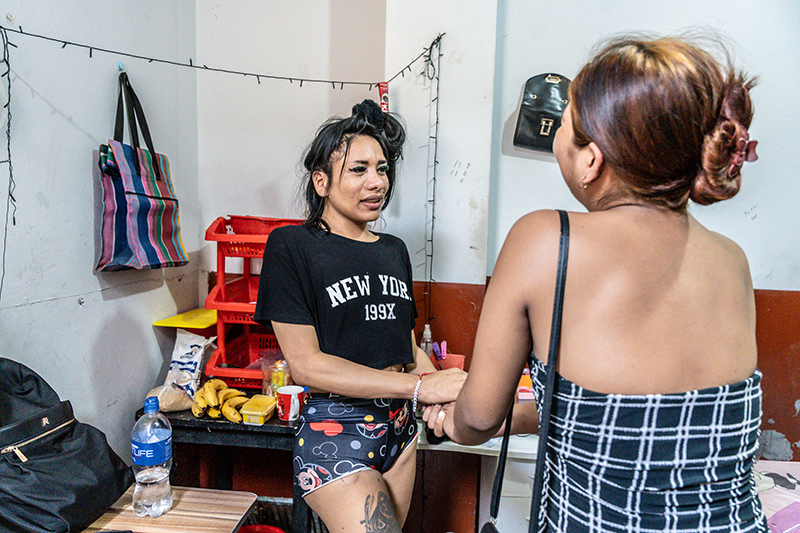They are Not Alone: Three Transgender Women’s Stories of Resistance in Peru
In the midst of adversity, three transgender women in central Lima help each other to cope with lives marked by violence and discrimination.
Posted June 5, 2024
 N., Paloma, and Daniela, tenants of “El Muro”, have found community with one another, facing the difficulties that arise at work and in everyday life together. Photo by Diego Diaz Catire / PIH
N., Paloma, and Daniela, tenants of “El Muro”, have found community with one another, facing the difficulties that arise at work and in everyday life together. Photo by Diego Diaz Catire / PIH
If Paloma misses something from her native home of Condorcanqui, a province located in the Amazonas department of eastern Peru, it is the regional food. That’s why the 21-year-old usually prepares tacacho, or mashed, boiled plantains with cured meat, in her room in El Muro, or The Wall. The wall is a nickname for her central Lima home—which houses transgender women like her—because of the concrete block that protects the entrance.
Paloma’s best dinner guest is N., a 15-year-old transgender teen girl who also arrived from Condorcanqui a year ago to join this home. Paloma and N. share their local food with Daniela, 23, who, although she comes from Iquitos, the largest metropolis in the Peruvian Amazon, feels like she’s from the country next to her two neighbors. Alongside the gentle heat of the stove, a friendship has been brewing among the three of them.
“You can’t cook or eat alone,” says Paloma”
And, for these women, you can’t work alone either. Late at night, the three of them usually go out together on the street. With power in numbers, it is a measure that they have taken to confront situations of violence and discrimination to which they are exposed due to their gender identity. They, like 62% of trans women in Peru, according to figures from the nation’s Ombudsman’s Office, consider sex work as the only employment option.
Socios En Salud, as Partners In Health is known in Peru, seeks to understand these dynamics to provide better informed health care to the transgender population, among the priority communities due to their condition of vulnerability, through the JunTrans program. From October 2023 to May 2024, the JunTrans team has helped 7 transgender women process their national identity document, screened 353 transgender women for HIV/syphilis, and identified 23 new HIV cases and 14 new syphilis cases. Through comprehensive interventions, Socios En Salud staff can help the transgender community gain greater trust in and utilization of the national health system.
 Carla Rodríguez, JunTrans project coordinator (seen standing) and technical assistant Walter Rojas (far right) speak with N., Daniela, and Paloma in their home at El Muro. Photo by Diego Diaz Catire / PIH
Carla Rodríguez, JunTrans project coordinator (seen standing) and technical assistant Walter Rojas (far right) speak with N., Daniela, and Paloma in their home at El Muro. Photo by Diego Diaz Catire / PIH
More Than a Health Worker
Paloma says that she and her friends usually wake up between 9 and 10 a.m. She, the most punctual among the three, according to Daniela, starts her workday at 4 p.m. and returns to El Muro at 10 p.m., although there are days when she starts later. “If I leave at 8 or 10 at night, I return at midnight or 1 in the morning,” she says.
For our JunTrans program, a community-based intervention that seeks to improve access to health care for transgender women in Lima, Socios En Salud takes these work schedules into account when visiting or providing care to the women.
We try to understand each one of them from their position. We do not come as health personnel. The treatment is empathetic so that they open up to us,” says Carla Rodríguez, JunTrans project coordinator
Rodríguez and her colleagues start with the small details. If a woman is going to be screened for tuberculosis, HIV, or other sexually transmitted infections (STIs), then they are scheduled from noon until late at night, when they are available. Additionally, JunTrans teams visit spaces familiar to the community to share information and resources with transgender women who would benefit from these services.
One example is at volleyball championships that transgender women in Lima organize from time to time. At the opening of the tournament that took place in February, the JunTrans team attended and performed 30 HIV tests.
Improving Access to Hormone Therapy
Daniela does not feel nostalgic for the place where she was born, not missing the heat of the jungle. N. and Paloma agree with her; they say the high temperatures of the Amazon cause burning where they have injected oil and silicone to alter their appearance, because they cannot afford cosmetic surgery or hormone therapy.
 Daniela, left, and N. provide support for one another as friends and neighbors in El Muro. Photo by Diego Diaz Catire / PIH.
Daniela, left, and N. provide support for one another as friends and neighbors in El Muro. Photo by Diego Diaz Catire / PIH.
I would like to do everything,” says Paloma, in relation to gender-affirming care. But economic limitations, as well as limited trained health personnel in the needs of sexual and gender minorities, lead many transgender women to pay for risky alternatives that could impact their health. Because of this, JunTrans has begun a hormone therapy pilot with seven transgender women who receive free care at one of Socios En Salud’s clinics, located east of Lima.
Dr. Alberto Mendoza, an infectious disease physician at Socios En Salud, highlights the importance of trained doctors monitoring “hormone therapy for feminization.”
“People who self-medicate run the risk of developing adverse effects from inappropriate medication or doses. They may also develop mild side effects, but if they are not treated, they can become complicated and be very harmful,” he says.
A Step Forward in Mental Health
In addition to the tropical climate, the three friends of El Muro recognize that there is another reason not to miss their homeland.
“In the beginning, there is always suffering,” says N., alluding to the unequal treatment she suffered at home due to her gender identity. “I don’t want to go back. I’m used to [Lima], there are districts that are more beautiful where there are tourists to get to know,” Paloma adds with a laugh.
María Fernanda Amézquita, JunTrans psychologist, specifies that among the transgender community there are many cases of “past violence” carried out by the family.
“Among the patients that I managed to screen, there was a lot of psychological and physical violence—in some cases, even sexual violence—that they normalized out of shame or fear,” she indicates.
The evidence is corroborated by a survey that Socios En Salud published in 2021: 82% of transgender women in Lima presented depressive symptoms due to the discrimination and violence they suffer. Since 2022 to the present, JunTrans has been offering mental health care services for transgender adults.
Paloma, Daniela, and N.—with support from Socios En Salud, JunTrans, and each other—are not alone.



